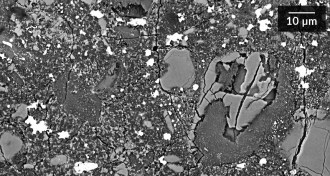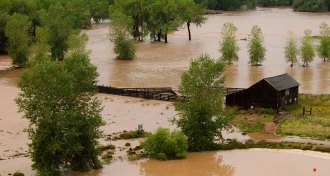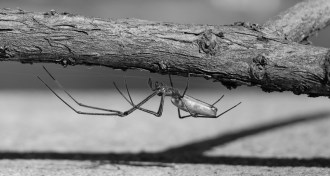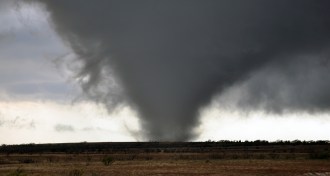Earth
Sign up for our newsletter
We summarize the week's scientific breakthroughs every Thursday.
-
 Earth
EarthExhibit lays out principles for disaster-resistant structures
The National Building Museum’s ‘Designing for Disaster’ exhibit showcases the science and engineering of making disaster-resistant infrastructure.
By Erin Wayman -
 Earth
EarthEarth’s most abundant mineral finally has a name
Bridgmanite, the planet’s most common mineral, christened after traces found in 1879 meteorite.
-
 Oceans
OceansRobotic subs reveal thicker Antarctic sea ice
New measurements by robotic subs suggest that scientists have underestimated Antarctic sea ice thickness.
-
 Earth
Earth‘Mass Extinction’ vivifies the science of die-offs
The dinosaurs were killed off some 65 million years ago after a colossal asteroid struck Earth. But what many people probably don’t know is how paleontologists came to that conclusion. "Mass Extinction: Life at the Brink" tells that story.
By Erin Wayman -
 Animals
AnimalsScientists’ tags on fish may be leading seals to lunch
In an experiment, 10 young grey seals learned to associate the sound of a pinging tag with fish. The tags may make fish vulnerable to predators, scientists say.
-
 Life
LifeTasty animals end up on latest list of threatened species
Growing food market lands several species, including Pacific bluefin tuna and Chinese pufferfish, on the IUCN Red List of Threatened Species.
-
 Environment
EnvironmentDDT lingers in Michigan town
Decades after a plant manufacturing DDT shut down in Michigan, the harmful insecticide is still found in neighboring birds and eggs.
By Beth Mole -
 Environment
EnvironmentColorado deluge produced flood of drug-resistance genes
Flooding in Colorado’s South Platte River Basin washed antibiotics and drug-resistance genes into pristine waterways.
By Beth Mole -
 Environment
EnvironmentSpiders enlisted as pollution sensors for rivers
Hunting arachnids provide a better picture of chemical threats to food web.
By Beth Mole -
 Climate
ClimateLightning strikes will surge with climate change
Climate warming could boost lightning strikes in the United States by roughly 50 percent over the next century.
-
 Environment
EnvironmentThirdhand smoke poses lingering danger
Harmful cigarette chemicals that linger on surfaces, known as thirdhand smoke, can go on to pollute the air and may harm people’s health.
By Beth Mole -
 Earth
EarthMore multi-tornado days in the forecast for U.S.
The number of days per year with tornadoes has gone down over the last few decades in the U.S., but the number of days that see 30 or more twisters is going up.